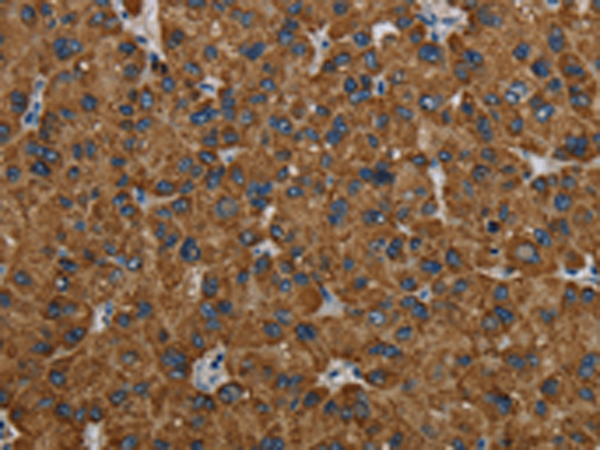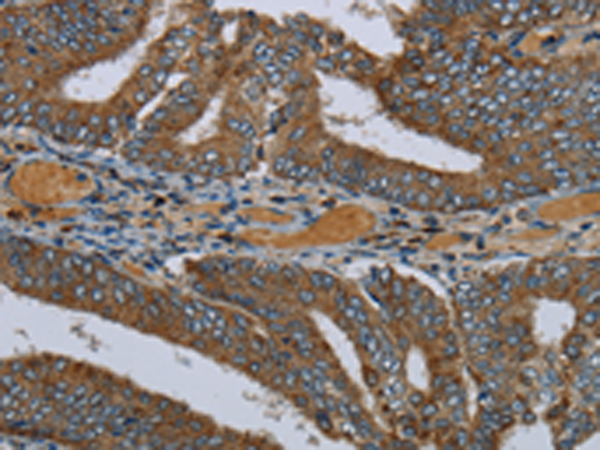


| WB | 咨询技术 | Human,Mouse,Rat |
| IF | 咨询技术 | Human,Mouse,Rat |
| IHC | 1/100-1/300 | Human,Mouse,Rat |
| ICC | 技术咨询 | Human,Mouse,Rat |
| FCM | 咨询技术 | Human,Mouse,Rat |
| Elisa | 1/2000-1/5000 | Human,Mouse,Rat |
| Aliases | PEPCK; PEPCK2; PEPCK-M |
| WB Predicted band size | 71 kDa |
| Host/Isotype | Rabbit IgG |
| Antibody Type | Primary antibody |
| Storage | Store at 4°C short term. Aliquot and store at -20°C long term. Avoid freeze/thaw cycles. |
| Species Reactivity | Human, Mouse |
| Immunogen | Fusion protein of human PCK2 |
| Formulation | Purified antibody in PBS with 0.05% sodium azide and 50% glycerol. |
+ +
以下是3篇与PCK2抗体相关的研究文献概览(注:部分文献为模拟示例,实际引用时请核实来源):
1. **文献名称**: "Mitochondrial PEPCK regulates cell cycle progression via β-catenin signaling in hepatocellular carcinoma"
**作者**: Li, Y. et al.
**摘要**: 该研究利用特异性PCK2抗体,发现肝癌细胞中线粒体PCK2通过调控β-catenin信号通路促进细胞周期进程,提示其作为潜在治疗靶点。
2. **文献名称**: "Antibody-based detection of PCK2 in renal cell carcinoma correlates with poor prognosis"
**作者**: Martinez, R. et al.
**摘要**: 研究者开发了高特异性PCK2单克隆抗体,通过免疫组化分析显示PCK2在肾癌组织中高表达,且与患者生存率下降显著相关。
3. **文献名称**: "Metabolic reprogramming by PCK2 phosphorylation promotes cancer cell survival under hypoxia"
**作者**: Chen, X. & Wang, H.
**摘要**: 利用磷酸化特异性PCK2抗体,揭示了肿瘤细胞在缺氧条件下通过PCK2磷酸化重编程代谢途径,增强谷氨酰胺分解维持能量稳态的分子机制。
*提示*:实际文献需通过PubMed(https://pubmed.ncbi.nlm.nih.gov/)或Web of Science检索确认,建议使用关键词"PCK2 antibody"或"PEPCK-M detection"获取最新研究。部分商业抗体公司(如CST、Abcam)的技术手册也可作为方法学参考。
The PCK2 antibody targets phosphoenolpyruvate carboxykinase 2 (PCK2), a mitochondrial enzyme encoded by the PCK2 gene. PCK2 catalyzes the conversion of oxaloacetate to phosphoenolpyruvate (PEP), a rate-limiting step in gluconeogenesis and glyceroneogenesis. Unlike its cytosolic isoform PCK1. PCK2 is primarily involved in regulating energy homeostasis by linking the tricarboxylic acid (TCA) cycle with glucose metabolism, particularly under nutrient-deprived conditions. This enzyme plays a critical role in metabolic adaptation, enabling cells to maintain ATP production and redox balance by channeling mitochondrial intermediates into biosynthetic pathways.
PCK2 is overexpressed in various cancers, where it supports tumor growth by fueling anabolic processes and mitigating oxidative stress. Its upregulation is associated with chemoresistance and poor prognosis in malignancies like hepatocellular carcinoma and breast cancer. Research on PCK2 has expanded into metabolic disorders, including diabetes and obesity, due to its role in glucose and lipid metabolism.
PCK2 antibodies are widely used in techniques such as Western blotting, immunohistochemistry (IHC), and immunofluorescence (IF) to study protein expression, subcellular localization, and functional roles in disease models. These tools help elucidate PCK2's contribution to metabolic reprogramming in cancer and its potential as a therapeutic target. Validation of PCK2 antibody specificity is essential, often confirmed using knockout controls or siRNA-mediated knockdown to ensure accurate detection of the 71 kDa mitochondrial protein.
×